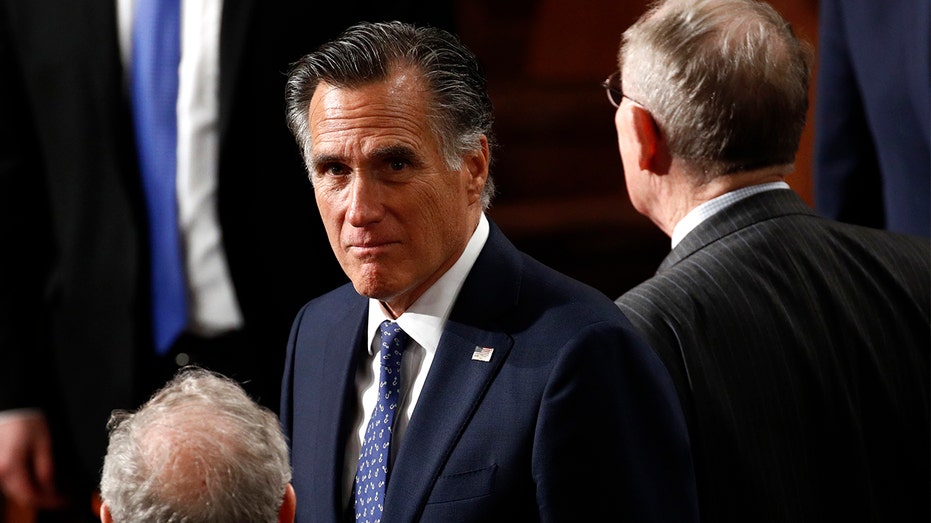Universal basic income could be coming for kids
Tax-credit proposals would send almost every parent $250 or more a month
Entrepreneurs, intellectuals and presidential candidates have in recent years touted “universal basic income,” a cash stipend to everyone with no strings attached, as the answer to poverty, automation and the drudgery of work. It has never gotten off the ground in the U.S.
Instead, something similar in spirit but cheaper and more practical may be in sight. Both President Biden and Sen. Mitt Romney (R., Utah) have proposed significantly expanding the child tax credit and dropping many of its restrictions, in effect turning it into a near-universal basic income for children.
GET FOX BUSINESS ON THE GO BY CLICKING HERE
The main aim of their proposals is to reduce child poverty, which is higher in the U.S. than in most advanced countries. Both would slash the number of children in poverty by around 3 million, or a third, according to the Niskanen Center, a center-right think tank.
In the process, it may also become the only major benefit in the U.S. that achieves near universality—testing traditional American notions of the safety net. “It would be a huge change in how we think about delivering benefits,” said Elaine Maag, principal research associate at the Urban Institute.
Federal benefits usually require the recipient to meet some criterion of need: poor (for food stamps, welfare and Medicaid), unemployed (for unemployment insurance), working or looking for work (the earned-income tax credit and some programs with work requirements), or disabled (Social Security Disability Insurance). Only Social Security and Medicare approach universality: Almost all elderly are eligible.
While some 90% of households with children qualify for the current child tax credit, many don’t get the full $2,000 because they don’t owe enough tax. At most, they can receive back $1,400 more (the refundable portion) than they owe.
Mr. Biden’s plan, as detailed in legislative language unveiled by House Democrats last week, would boost the credit to $3,600 for a child under 6 and $3,000 for a child aged 6 to 17 and make it fully refundable, meaning even a parent with no income would receive the full amount. The boost would start to phase out for individuals earning $75,000 a year and couples earning $150,000. The remainder would phase out starting at incomes of $200,000 a year for individuals and $400,000 for married couples, as it does under current law.
Mr. Romney would raise the credit for children under 6 even more, to $4,200. He would match Mr. Biden’s $3,000 for older children and start phasing out the full amount at $200,000 a year for individuals and $400,000 for couples. He would also replace the current earned-income tax credit, which is more generous for people with children, to a standard amount per family.

Sen. Mitt Romney, R-Utah, arrives before President Donald Trump delivers his State of the Union address to a joint session of Congress on Capitol Hill in Washington, Tuesday, Feb. 4, 2020. (AP Photo/Patrick Semansky)
The upshot is that under Mr. Biden’s plan, families with two children would typically receive $6,000 to $7,200. Under Mr. Romney’s plan—$6,000 to $8,400. That’s less than the $12,000 per adult in universal basic income proposed by Andrew Yang, former Democratic candidate for president and now candidate for mayor of New York City. But it’s a lot of money to a lot of parents, regardless of whether they work and (almost) regardless of how much they earn.
Almost as important is how the plans are administered: Both Mr. Biden’s and Mr. Romney’s proposals would pay the credit each month, instead of once a year when the recipient files his or her taxes. Mr. Romney goes further by entrusting the job to the Social Security Administration, which already sends monthly checks to Social Security beneficiaries. Mr. Biden would leave it to the Internal Revenue Service.
Ms. Maag said the IRS is better positioned to administer the plan right away; it already delivers some kind of benefit to 95% of families with children and has shown it can quickly send out checks as it did with last year’s pandemic-relief legislation.
But Melissa Kearney, an economist at the University of Maryland, thinks calling the benefit an allowance and administering it through Social Security would underline that this isn’t just another provision of the tax code. While academics consider a tax credit and an allowance “mathematically equivalent, in practice, they are not,” she said. Just as Social Security represents a commitment to end elderly poverty, a child allowance would do the same for child poverty, she said. “We should set our priorities as a nation and then commit to spending on them.”
Universal basic income for kids costs a lot less than UBI for everyone. Ms. Kearney has estimated UBI for adults, depending on the design, would cost $1 trillion to $2.5 trillion a year. By contrast, Mr. Romney’s plan would add $66 billion to current costs, which he would finance by ending several tax provisions and federal welfare block grants. Mr. Biden’s would cost $105 billion. He has yet to identify a permanent funding source.
CLICK HERE TO READ MORE ON FOX BUSINESS
UBI could discourage a lot of able-bodied adults from working, although experimental evidence is inconclusive. By contrast, the National Academy of Sciences estimates a $3,000 annual child allowance would reduce employment by only about 100,000 workers (compare that to the 1.4 million jobs a $15-an-hour federal minimum wage would cost, according to the Congressional Budget Office). Moreover, those who work less are probably spending more time raising their children, a trade-off most Americans can relate to.
UBI for kids is also easier to sell politically. Many liberals like that most of UBI for kids goes to those on lower incomes without robbing other parts of the safety net. Some conservatives like that it’s pro-family. The two may be enough to make it happen.






















